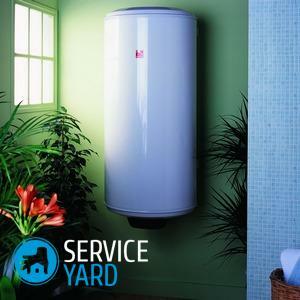
- Reasons for the appearance of an unpleasant ambre
- Stink from hot water
- How to deal with bacteria?
- Prevention measures
In modern life there are cases of lack of central hot water: these can be system failures due to an accident or preventive measures. In such cases, a boiler comes to us. This is a device consisting of a heating element and a tank. The boiler provides heating of water and maintaining it at a certain temperature for a while. But when using the equipment, there are cases when the water begins to smell of hydrogen sulfide. Many consumers believe that this is due to poor water in the water pipe, whereas the cause is often hidden in the heater. Consider if there was a specific smell of water from the boiler - how to eliminate it, and whether it is necessary to do something at all in this situation?
to content ↑Reasons for the appearance of an unpleasant ambre
As a rule, a smell of hydrogen sulphide - a gas that smells rotten eggs. It is a product of the vital activity of some species of bacteria. If, when using a boiler, water comes with an unpleasant, pronounced aroma, it means that these bacteria are actively multiplying inside the tank.
The reasons for this may be different:
- Low water quality from the water supply. Bacteria hit the walls of the tank and begin to actively reproduce there.
- Poor quality of pipes through which water is fed into the unit. Cheap plastic pipes smell of chemistry, passing this smell to the water. And in old pipes on the inside surface over time a precipitate forms, which gives an unpleasant ambre.
- The formation of a colony of microorganisms inside the tank. When operating on internal elements, a layer of deposits, mucus and scale appears. This leads to the appearance of bacteria, fungi and other microorganisms, which, growing, produce a large amount of hydrogen sulphide, which leads to smell from the boiler.
Stink from hot water
It also happens that the smell comes from hot water coming from the boiler. That is, cold - goes in the usual form, and hot - it smells of hydrogen sulfide. Here your unit is guilty. Using home filters does not always help, because over time, bacteria form a film that simply clogs the device. A washing biofilm is not removed.
Many make a very common mistake - they start using the equipment in a sparing mode, that is, do not heat it above 60 degrees. This only contributes to an even greater multiplication of bacteria. As a result - the smell is growing stronger and stronger, and eventually the boiler just goes out of order.
Important! For prevention, it is necessary to heat the water in the tank to the maximum temperature, at least once a month.
to the contents ↑How to deal with bacteria?
If you have a smell of water from a boiler, how can I eliminate it? There are different ways to fight harmful bacteria:
Installing the
filter Install a special filter that absorbs gaseous volatile ethers.
Important! You can install such filters under each tap.
Complaint to the appropriate authorities
Report to the Sanitary and Epidemiological Service for poor water quality. There is a chance that with time this problem will be eliminated.
Cleaning the boiler
If the problem is in the unit itself, then more effective measures must be taken:
- First you need to drain all the liquid from the unit and fill it clean.
- Then turn on the heater at full power and let's work in this mode for a long time.
- Then again completely drain the water.
- Now you can fill the unit with water and use it in the normal mode.
Prevention measures
To prolong the life of the water heater and prevent the appearance of an unpleasant odor, it is necessary to carry out regular maintenance and follow preventive measures for the boiler:
- Do not leave water in the unit, which does not work for a long time. If you do not plan to use the boiler in the near future, the best way out is to drain the water from it.
- Periodically clean the unit of scale. If it's hard for you to do this yourself, call the wizard.
- Do not skimp on filters. A good filter is a guarantee of improving the quality of water. This will extend the life of your water heater.
- Monitor the quality of the water, in which case - do not hesitate to seek help from the Sanitary and Epidemiological Station.
- Check the operation of the thermostats.
- If necessary, replace the anode. It accumulates mud deposits. This leads to an unpleasant odor and breakdown of the unit.
- In due time, make a replacement of the heater.
If you do not follow the preventive measures, the boiler can quickly fail and the cost of its repair will be decent. So do not ignore them, and when there is a smell of water from the boiler or other non-standard phenomena in his work, solve the problems urgently.


